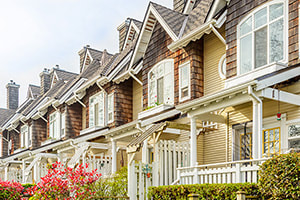 A water-efficient landscape reduces outdoor water usage and saves you money on your water bill. Here are some ways to create and nurture a water-conserving landscape. Don’t Waste Water Watering your plants and trees in the cooler hours of the morning helps them retain water and lose less of it to evaporation. Avoid watering at the end of the day as wet leaves on plants and trees can lead to mildew and fungus. Soaker hoses use 50% less water than sprinklers. You can lay soaker hoses in your garden bed and leave them there all season. Use Native Plants Growing native plants lowers your water usage because they’ve had generations to acclimate to the local soil, climate, and rainfall. Learn which plants and trees are native to your area by visiting a local botanical garden or gardening association. You can also research online and consult local gardening business owners to find the best native plants for your landscaping needs. Think About Plant Size Before placing larger plants in your yard, find out how tall and wide the shrubs and trees grow, their water requirements, and sunlight needs. Don’t overcrowd your plantings, as this will require additional water. Instead, remember that sparse initial plantings will fill in as they grow and mature. Mulch Correctly Placing mulch around plants and trees helps reduce water loss while combating weeds that can steal water from your greenery. Buy bark mulch from the store or use organic mulches such as pine needles, grass clippings, or ground-up leaves, which help add nutrients to the soil in your garden. Use Porous Path Material When you make your garden paths out of porous materials such as pebbles, gravel, spaced bricks, or pavers without mortar, water can reach the ground and nourish plant roots. Using nonporous materials such as concrete creates water runoff that can cause erosion. To prevent weed growth through porous path materials, lay down a layer of landscaping paper before adding the pebbles or gravel.
0 Comments
 A homeowner’s association (HOA) is a private organization that oversees a group of homes in a community, common in condominiums, town houses, and master-planned subdivisions. The HOA is managed by a board of directors elected by the community’s residents, and anyone who buys a home in an HOA neighborhood is required to become a member and abide by the organization’s rules. Here’s what an HOA does for you: Protects Home Values HOAs enforce specific rules designed to maintain uniformity and uphold neighborhood appearances. For example, some HOAs prohibit residents from parking broken-down vehicles on front lawns, letting their grass grow too tall, or building unsightly attractions. An HOA may also enforce noise restrictions and curfews. Well-maintained and safe neighborhoods are more likely to draw in potential buyers. Provides a Sense of Community Forming an HOA fosters a greater sense of community among the residents. Neighbors have the opportunity to meet one another when using their shared amenities, attending HOA meetings, or participating in organized social events such as block parties. Maintains Common Areas and Funds Amenities The homeowner’s association is responsible for maintaining the neighborhood’s common landscaping areas, which sometimes means planting trees and mowing the lawn in front of each home. Many HOAs also feature perks like community swimming pools, playgrounds, or tennis courts, all maintained and funded by the HOA. Enforces Rules and Restrictions With some stricter HOAs, you may need approval to make changes to your home’s exterior—even minor ones such as what color you can paint your door or how high a fence can be. There may also be restrictions on renting out your home or a limit on how many people can live there. Violating HOA rules could result in hefty fines. Determines Costs of Benefits Living in a community with an HOA has advantages, but you will need to pay HOA fees on a monthly or yearly basis. Generally, the more special features the neighborhood has, the higher the HOA costs will be. Living in a community with an HOA can be a great option for homeowners. However, it’s not the right choice for everyone. Consider the benefits and drawbacks of an HOA as you look for your new home. |
AuthorBe informed with the latest real estate news and useful real estate related information. Archives
March 2025
Categories
|
